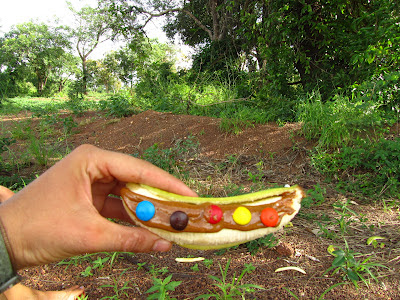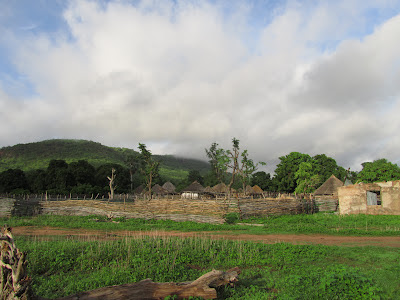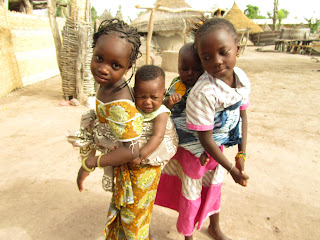Sheep lots are to Tabaski as Christmas
tree lots are to Christmas
Tabaski (or Eid al-Adha) is one of the most important
Islamic holidays when Muslims celebrate Abraham's willingness to
sacrifice his son, Ishmael. Instead, Abraham slaughtered a sheep as a
sacrifice to god. To commemorate this event, Senegalese kill sheep
and eat the meat for the following few days.

A week prior to Tabaski I took a short
trip to Thies and Dakar, not realizing the impact that Tabaski preparation has on
Senegalese economy and daily routine. Fields on the side of the road
that are typically empty were instead filled with Pulaar men and
their herd of 20 or more sheep. Each man proudly stands next to their
crop that they have tied together with a rope, making the sheep form
a large, noisy circle. We passed by over ten of these 'lots', each with more sheep circles than the one before. Depending on the size, a sheep can go from 30 USD to over
300 USD. The bigger the sheep you buy, like bigger the tree, the more
impressive and successful you appear to be.
I was taking a 'mini bus' back to my
village, when we stopped to load on one of the passenger's cargo. And lo
and behold, it was about 25 sheep that were loaded onto the top of
the car and stuffed underneath our feet. At one point, to the chagrin of the
owner, one of the badly tied sheep fell off the top. He survived. As
I descended the car, I realized that I was covered in sheep hair.
Lovely.
Chopping down Christmas trees are to
Christmas as slaughtering sheep is to Tabaski
The morning of Tabaski I awoke to the
sound of a beating drum, summoning the call to prayer. I dressed
quickly as I did not want to miss any of the exciting events. I soon
discovered that the only real thrilling thing that happens on
Tabaski (like many big holidays) is cooking and eating. After helping cut onions for over an hour, I saw
the men sharpening knives and knew what it meant. The killing had commenced!

In less than 10 minutes there were 7
dead sheep with their necks sliced open and blood splattering the dirt. The boys and men worked together to saw away at the sheep, placing meat pieces on random scraps of metal.
The meat was the distributed to the woman to cook different parts in
different shifts throughout the day. (oh and of course all this meat
just sits out for the next two days with flies and other insects
crawling on it. Everyone touches the raw meat and then eats
without washing their hands. Needless to say my stomach was not very
happy for the following few days.) I saw more meat consumed on
this day than I have the entire time I have been in my village combined.
 |
| The important female elders feasting over a massive bowl of meat |
Going to the market is to Tabaski as
going to the mall is to Black Friday
The other major aspect of Tabaski is
getting new clothing. The only time for the entire year that most
people get new clothing is for Tabaski. Most children received two new
outfits, a pair of new shoes and new jewelery. In addition, all the
girls had their hair done in fancy up-does, with yarn or hair
extensions that go down their backs. Even a week prior to Tabaski,
going to the market is insane, everyone is fighting over articles of
clothing, bargaining for jewelery and trying to find the correct size
of shoes. I was not brave enough to fight through the crowds and
decided to buy bananas outside of the zoo rather than venture
in.
My 6 year-old sister was so excited to
put on her new outfit that before she even showered on Tabaski morning she demanded to
put on her skirt-shirt combo. Sadly, the top was too small to fit
over her head and after 5 of us tried to pull it over her, we gave
up and the outfit was put on the 8 month old baby. So cute.
 |
| Baby Ami is wearing the oversized/undersized outfit, held by Naye. |
The climax is to Tabaski
as the climax is NOT to New Years
 |
| Bintu all dressed up, ready to go! |
Unlike the kids, I was less excited to
put on my outfit that I had gotten sewn for my Swearing in Ceremony.
As pretty as it is, it is so hot and uncomfortable so I kept pushing
it off until my mother wore her new outfit.
After lunch she said she
would not put it on until the next day when all the woman go to greet
other families and surrounding villages. I too decided to put it off until morning.
So the next day, I
bravely put on my complet and prepared myself for an exhausting day
of greetings. After gathering together with over 40 woman, all
dressed in their new, fancy outfits, showing off their embroidery and
new necklaces, we set out. On the short walk to Dialacotto I got many
shouts from impressed villagers and had several head scarves thrown
at my feet. (This means that my outfit was fancy and I was supposed
to throw money onto it.)
We arrived at a compound I had never been before
and all 40 of us stuffed ourselves into their little room where an
elderly, possibly blind woman, was sitting. After several rounds of
greetings and prayers for the coming year we got up and left. I
thought to myself, well that is not bad, went by fairly quickly. How
many more people will we greet? I soon learned that that was it. We
were headed back home. I could not believe it! We all got dressed up
for that! All of you have been preparing for months for that! To greet one lady and then go home!
I took off my already
sweaty complet after having worn it for less than two hours. What an
odd, uneventful event.






































